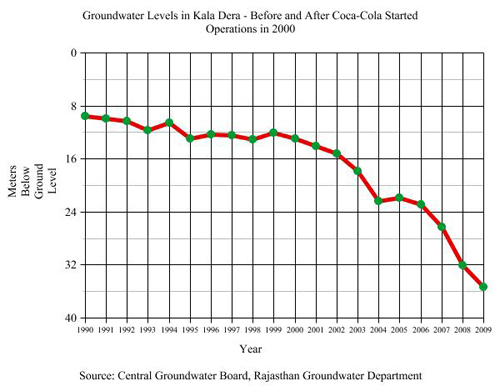|
Home--News
PRESS: Groundwater Levels Continue Downward Spiral Around Coca-Cola Plant
Continues Bottling in Drought Area, Farmers and Villagers Left Without Water
For Immediate Release
March 11, 2010
Kala Dera, India: The Coca-Cola company has continued to operate its bottling plant in Kala Dera in Jaipur, India even as the area has been declared a drought area last summer and the groundwater levels are falling sharply – leaving the largely agrarian community with severely restricted access to water.
Data obtained this week by the India Resource Center from the Central Groundwater Board, a government agency, confirm that groundwater levels in Kala Dera fell precipitously again – a drop of 4.29 meters (14 feet) in just one year between August 2008 and August 2009, from 30.83 meters below ground level to 35.12 meters respectively.
The latest government figures on groundwater depletion are extremely alarming given last year's sharp drop in groundwater levels - 5.83 meters (19 feet) between May 2007 and May 2008.
Kala Dera has never experienced such sharp drops in groundwater levels and such precipitous drops have become common since Coca-Cola started its bottling operations in 2000.
In the nine years prior to Coca-Cola’s bottling operations in Kala Dera, groundwater levels fell just 3 meters. In the nine years since Coca-Cola has been operating in Kala Dera, the groundwater levels have dropped 22.36 meters.
The community of Kala Dera and surrounding villages have challenged Coca-Cola for depleting the water resources and destroying livelihoods, demanding that the bottling plant be shut down.
A study paid for by Coca-Cola and conducted by the Energy and Resources Institute (TERI) in 2008 confirmed the community allegations and concluded that Coca-Cola’s use of water in Kala Dera was unsustainable. The study recommended that Coca-Cola shut down the plant, relocate the plant or bring in piped water from outside the area to meet its production needs.
Coca-Cola has chosen to ignore the recommendations of the study and, not surprisingly, the groundwater conditions continue to worsen dramatically.
Kala Dera is a water-stressed area and the government declared the area’s groundwater resources as over-exploited in 1998. Yet the Coca-Cola company built a new bottling plant in 2000.
Coca-Cola refuses to share the Environmental Impact Assessment (EIA) it says it conducted prior to building the plant “due to legal and confidential reasons.” An adequate EIA should have informed Coca-Cola that the area was already water-stressed and a bottling plant will seriously aggravate the existing water crisis in the area.
Coca-Cola, meanwhile, has announced that it has become “water positive” in Kala Dera, implying that they recharge more water than they use. Coca-Cola officials also suggest that groundwater levels have increased as a result of their bottling operations in Kala Dera. A visit to Coca-Cola’s rainwater harvesting structures in the area by the India Resource Center found them ill-maintained and not functional. The TERI study also found all Coca-Cola rainwater harvesting projects to be in “dilapidated” conditions.
“Water is life and by denying us our water, Coca-Cola is destroying our lives and livelihoods. We urge people around the world to put pressure on Coca-Cola so that they shut down the bottling plant in Kala Dera,” said Mahesh Yogi of the Kala Dera Sangharsh Samiti, the community group spearheading the campaign.
“Coca-Cola’s continued operations in Kala Dera are nothing short of criminal. In spite of the growing evidence, including the company’s own study, that confirm its operations are not sustainable, the company chooses to operate recklessly without regard to the well being of the community. If Coca-Cola were at all serious about being the water steward they claim to be, it would not suck water in drought areas and it would immediately discontinue its operations in Kala Dera,” said Amit Srivastava of the India Resource Center, an international campaigning organization that works with the community in Kala Dera to oppose the plant.
The community groups in Kala Dera and surrounding villages have vowed to continue their campaign to shut down Coca-Cola.
For more information, visit www.IndiaResource.org
Contact:
Amit Srivastava, India Resource Center +91 98103 46161 (India), +1 415 336 7584 (US)
Mahesh Yogi, Kala Dera Jan Sangharsh Samiti, India +91 98295 99140
---ends---
FAIR USE NOTICE. This document contains copyrighted material whose use has not been specifically authorized by the copyright owner. India Resource Center is making this article available in our efforts to advance the understanding of corporate accountability, human rights, labor rights, social and environmental justice issues. We believe that this constitutes a 'fair use' of the copyrighted material as provided for in section 107 of the U.S. Copyright Law. If you wish to use this copyrighted material for purposes of your own that go beyond 'fair use,' you must obtain permission from the copyright owner.
|

![]()
